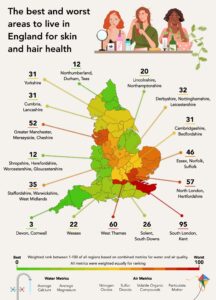Damaging content on social media contributes to a low sense of self-worth and a rise in eating difficulties, new study reveals

Three out four (77%) children and young people are now unhappy with how they look, with some as young as 12 saying “I’m fat,” “I’m embarrassed by my body,” “I’m not muscular enough,” and “My body doesn’t represent who I am.”
At the same time, nearly half (45%) of all 12-21 year-olds say they are regularly bullied by people they know, or trolled online about their physical appearance: “You looked better when you were anorexic,” “You’re annoying and ugly,” “A creep from a horror film,” “Move out the way there’s no space on bus, walk it and lose some weight,”
Nearly all (97%) young people are now on social media, clocking up an average of 3.65 hours a day on apps that have become very much part of their lives. When seeking to overcome negative feelings of low self-worth about their bodies, they are four times (76%) more likely to turn to social media apps such as Tik Tok or Instagram than to talk to friends and family (18%). There is an irony in this, as most (69%) young people also say that social media has a negative effect on their mood, making them feel stressed, anxious, and depressed. Many of them (62%) are worried that their mental health is being damaged by the online content that is pushed at them through social media algorithms, and by the amount of time they are spending on social media. With young people checking their phones compulsively, most (95%) say they feel helpless when it comes to quitting their online habit.
These are the Important findings of a new survey of 1,024 12-21 year-olds, by youth mental health charity stem4, which says that urgent action is needed in the form of more effective evidence-based early mental health interventions, and research to better understand the potentially compelling impact of social media content and the reinforcement created through algorithms on young people’s engagement and through this, their mental health. Moreover, stem4 warns that if social media firms continue to profit from the use of algorithms, and thus young people’s data, without addressing the impact of uncensored content and how behaviour is reinforced, there will be further escalation of difficulties associated with body image and eating disorders alongside other mental health and social interaction issues. This represents a significant risk to the current and future health of today’s young generation.
One young person said: “Social media is definitely negatively affecting me. As young people, we constantly compare ourselves to good-looking people online. On sites like TikTok, the only people you see are gorgeous due to the algorithms and that makes us feel really bad about ourselves.”
Another commented: “Social media has a huge impact on how we see ourselves. I began to become unhappy with myself and self-image as I constantly compare myself to influencers. I have to remind myself that not everything I see online is true. Social media has affected society’s beauty standards, and I feel pressured to look like something that’ been edited and altered. It grows judgmental behaviour and forces you to label. If social media didn’t exist, I wouldn’t compare myself or be compared, and I’d just get on with life.”
While another added “The mental health of young people has severely plummeted since the pandemic. In my case being deprived of going out, seeing friends and family, and going to school led me to constantly check social media to keep up to date with celebrity physiques, which then left me feeling emotionally beat up. I turned to food as some sort of coping mechanism which turned into a vicious cycle of eating and purging. Even before the pandemic fat shaming and slamming anyone who is overweight already existed on social media and TV.”
Things are now at a point where four in ten (42%) 12-21 year-olds (51% of females 31% of males) say they are in mental health distress. In addition, 17% of 12-21 year-olds are experiencing body image issues (21% of females 13% of males) and 14% are experiencing eating difficulties, such as restrictive eating, binge eating, and purging/vomiting (16% of females 10% of males). Of those in need of support, just one in ten young people are receiving treatment for body image issues and eating difficulties.
According to mental health charity stem4, these children and young people are being let down by both the government and social media companies. Since the pandemic, demand for NHS child and adolescent eating disorder services increased by two thirds, with 10,000 young people starting treatment between April – December 2021. Yet levels of provision are such that treatment is only available to those in the most serious need. With no early interventions available to them, young people are being left to fend for themselves. In search of help they then turn to the social media virtual community and the promises it offers, only to be overwhelmed by new and harmful content and left with a feeling of deteriorating self-worth.
Worth Warrior, a free, safe app, to help young people with body image and eating difficulties
As an antidote to this situation, fighting like with like and using the mobile phone as a force for good, youth mental health charity stem4, with a grant from the NIHR, has created the Worth Warrior app. It is a free evidence-based, mobile phone app to help young people overcome issues of negative body image, low self-worth, and related early-stage eating difficulties or eating disorders. The Worth Warrior app, recommended for ages 12 and above, has been developed by Consultant Clinical Psychologist Dr. Nihara Krause, CEO and founder of youth mental health charity stem4, in collaboration with young people and clinician feedback. Using principles of Cognitive Behaviour Therapy for Eating Disorders (CBT-E), it provides a range of helpful activities and information, based on the notion that eating and body-related issues can be helped through learning to challenge and change negative thoughts, emotions, and behaviours towards body image, and improve underlying low self-worth.
Over the last 12 months over 750,000 young people have made use of stem4’s NHS-approved range of evidence-based apps, starting with Calm Harm for young people who self-harm, first launched in 2014 followed by 4 further apps.
Dr Nihara Krause, Consultant Clinical Psychologist and CEO and founder of stem4, commented:
“The findings of this survey are deeply worrying. All young people go through a rapid body change in teenage years, but global crisis after global crisis has left them in a constant state of anxiety and despondency, feeling out of control. It’s little wonder that young people feel more negative about their situation and start focusing more on their bodies as a way of self-control and to feel better about themselves. When they use social media apps to look for much-needed information and advice, they find themselves presented with a supposed reality that is distorted and harmful. In addition, their searches online then keep generating triggering content which compounds the problem.
“Most (90%) young people experiencing negative body image and eating difficulties are unable to access treatment, either because their symptoms are not considered severe enough and they don’t meet specialist service thresholds, or because they are too embarrassed or ashamed to ask for help. Although Worth Warrior shouldn’t be seen as a replacement for therapy delivered by trained mental health professionals, we hope this early digital intervention will provide these young people with the tools they need to challenge and change their negative thoughts, emotions and behaviours towards body image and eating problems. We hope this may both reduce the risks of developing an eating disorder while at the same time building their self-worth.”
stem4 surveyed 1,024 12-21 year-olds between 21 & 27 November 2022, and the survey was regionally representative. The survey also found that:
· Half of all young people (52% of girls and 48% of boys) say ‘I fear that if I don’t try to improve my body and how others see me, I will be rejected by my friends, and no one will like me’.
· 41% say that ‘when I think about my body, I have negative feelings of self-worth’, in other words they don’t feel good enough about themselves, or feel unworthy of friendship and love from others.
· Nearly half (45%) of young people have received negative and hateful comments about their appearance. They say that as a consequence this has caused them to withdraw (24%), exercise excessively (22%), stop socialising (18%), drastically restrict their food intake (18%), or self-harm in some way (13%).
· To feel better about their bodies, 48% of young people have dieted, skipped meals or fasted, taken supplements to lose weight or gain muscle.
· Despite age restrictions, nearly all (97%) 12-21-year-olds, now use social media apps such as Tik Tok (63%), Snap Chat (61%), Instagram (61%), YouTube (52%), and WhatsApp (43%). They watch videos and comment on body image issues (21%), follow influencers on how to get the perfect body (15%), and actively engage in conversations with people who share content about how unhappy they are (11%).
· Over half (55%) say social media algorithms keep pushing content at them based on information they’ve recently searched for online
· Most (69%) young people also say that social media has a negative effect on their mood, making them feel stressed, anxious, and depressed, a quarter (23%) say it negatively impacts them a lot.




